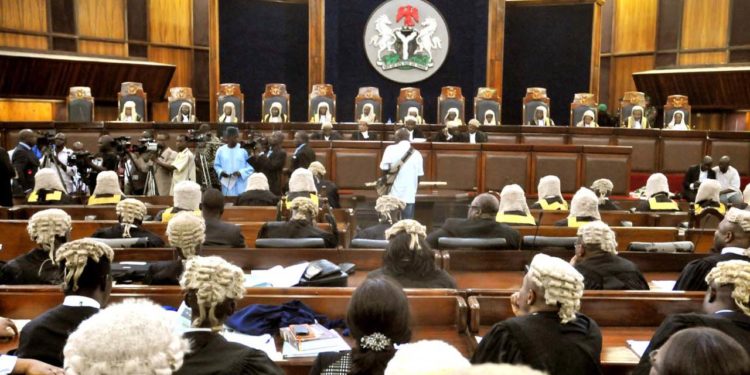Major Controversial Court Judgments In Nigeria 2023 have been compiled.
Newsone Nigeria reports that in 2023, the Independent National Electoral Commission (INEC) conducted the presidential, National, and governorship elections in Nigeria.
This online news platform can authoritatively report that the 2023 electoral process in Nigeria was widely condemned by political actors who filed court cases over what many described as “stolen” mandates.
Newsone Nigeria recalls that INEC in October revealed that it was faced with over 1,000 pre-election litigations in the buildup to the 2023 elections.
Following the court cases, the pronouncements and verdicts of judges have come under public scrutiny.
Apart from electoral-related cases, there are other controversial judgments in 2023.
Here are some of the major and controversial judgments of the year:
AKPABIO’S ‘MIRACULOUS’ EMERGENCE AS SENATOR FOR AKWA IBOM NORTH-WEST
The supreme court judgment which affirmed Godswill Akpabio as the Akwa Ibom north-west senatorial district on January 20, was received by many Nigerians as a surprise.
Akpabio contested for the presidential ticket of the All Progressives Congress (APC) while Udom Ekpoudom, a former deputy inspector-general of police (DIG), won the party’s primary for the Akwa Ibom north-west district.
However, after losing out in the race to secure the presidential ticket, the party conducted another primary poll which produced Akpabio as the winner.
The APC and Akpabio went before the federal high court to challenge INEC’s decision not to enlist any candidate for the senatorial district ahead of the general election.
While they got a favourable ruling at the trial court, the appellate court, on November 14, quashed the judgment and sacked Akpabio as the candidate of the party.
However, the apex court in its judgment held that the issue was an internal party affair which stripped the appeal court of jurisdiction to hear the matter.
LAWAN VS MACHINA: THE YOBE NORTH CONTROVERSY
In February, the Supreme Court declared Ahmad Lawan, former senate president, as the candidate of the APC for Yobe North district.
Bashir Machina, who had won the party’s ticket unopposed during the primary in May 2022, was asked to step down for Lawan after he lost out in the presidential primary in June 2022.
While Machina declined to step down, the APC in Yobe submitted Lawan’s name to INEC.
The electoral body did not recognise any candidate for the party. But Machina approached the court, seeking to be recognized as the authentic senatorial candidate.
In September 2022, Machina won in a federal high court in Damaturu, the state capital, and a month later, an Abuja court of appeal upheld his election as the APC candidate for Yobe north.
However, three out of five members of the supreme court panel later removed Machina, stating that the case at the trial court should not have started via an originating summons due to fraud allegations within it.
NAIRA REDESIGN POLICY
On March 3, the supreme court invalidated the naira redesign policy introduced by the Central Bank of Nigeria (CBN).
The redesigned naira notes were unveiled on December 23, 2022.
The deadline for the implementation of the policy was fixed for January 31, 2023, but it was further extended to February 10.
However, the policy was challenged by some state governors in court.
In its judgment, a seven-member panel of the apex court held that the old N200, N500 and N1000 notes remain legal tender until December 31, 2023.
The supreme court faulted the entire policy of the CBN, saying the timing and implementation were defective.
Also, the December 31 deadline has been extended indefinitely.
ABDULLAHI SULE’S COMEBACK AS NASARAWA GOVERNOR
On October 2, the election petition tribunal in Lafia, Nasarawa state, nullified the victory of Abdullahi Sule of APC as governor of the state and declared David Ombugadu, candidate of the Peoples Democratic Party (PDP), as the winner of the poll.
Two of the justices said Ombugadu won the election, while the third one dissented.
Consequently, Sule and the APC approached the appeal court seeking to overturn the verdict of the tribunal.
Ruling on the matter, the appellate court in Abuja, held that the evidence before it showed that the tribunal relied on “legally inadmissible evidence” to declare Ombugadu as the winner of the March 18 poll.
The court consequently reversed the tribunal’s decision and upheld Sule as the duly elected governor of Nasarawa.
NATASHA BECOMES KOGI’S FIRST FEMALE SENATOR
Having contested three different elections in Kogi state since 2019, Natasha Akpoti-Uduaghan’s efforts to serve the people of the state came to fruition in October after a judgment by the court of appeal in Abuja declaring her as the senator representing Kogi-central senatorial district.
After the February 25 election, INEC announced Abubakar Sadiku-Ohere of the APC as winner — by a margin of 369 votes.
Dissatisfied with the outcome of the election, Akpoti-Uduaghan, candidate of the PDP, approached the national assembly election petition tribunal seeking to nullify the poll over alleged “irregularities”.
In September, the three-member panel sitting in Lokoja, the state capital, said Ohere’s results were inflated in nine polling units in Ajaokuta LGA.
Kemakolam Orjiako, the tribunal chairman, added that INEC omitted the results of three other polling units meant for Akpoti-Uduaghan in the same LGA.
After necessary corrections were made, the court declared Akpoti-Uduaghan as the winner of the election with 54,074 votes, as against Ohere who garnered 51,291 votes.
Not contended with the judgment, Ohere headed to the appellate court to seek redress — but the court dismissed his appeal for lacking in merit and declared Akpoti-Uduaghan as the winner.
SUPREME COURT OKAYS CONTINUATION OF NNAMDI KANU’S TRIAL
Since 2021 when the trial of Nnamdi Kanu, leader of the proscribed Indigenous People of Biafra (IPOB) began, several cases have been filed against him and several judgments were given — but there is no finality yet.
Following his extradition from Kenya, Kanu is being held in the custody of the Department of State Services (DSS), while the federal government filed terrorism charges against him.
In April 2022, the federal high court struck out eight of the 15 charges against the IPOB leader.
The remaining seven counts were later quashed by the court of appeal on October 13, 2022.
The judge ordered that Kanu be released.
A few days later, the court granted a stay of execution on its verdict discharging Kanu, after the federal government filed an appeal at the supreme court.
Delivering judgment on December 15, the apex court reversed the verdict of the appeal court.
In a unanimous decision, the five-member panel held that even though the federal government acted “irresponsibly” by forcefully bringing Kanu back to the country from Kenya, no legislation prevents the trial court from continuing with the case.
NNPP LOSES ONLY GUBER SEAT AS COURT SACKS ABBA YUSUF AS KANO GOVERNOR
The nullification of Abba Yusuf’s election as governor of Kano is probably one of the most controversial court decisions of 2023.
Yusuf was the candidate of the New Nigeria Peoples Party (NNPP), and was the only elected governor on the platform of the party in the 2023 elections.
After deducting 165,663 votes from the 1,019,602 recorded for Yusuf, the tribunal, in September, sacked Yusuf and affirmed Nasiru Gawuna of the APC, as the winner of the poll.
The tribunal held that the ballot papers (165,663) were not stamped, signed and dated as required by law.
The decision of the tribunal was also affirmed by the court of appeal on November 17.
The appellate court added that Yusuf was not a member of the NNPP when he contested the election.
However, controversy trailed the verdict days later when a certified true copy (CTC) of the appeal court judgment surfaced, contradicting the November 17 ruling.
The copy of the judgment ruled against and in favour of the NNPP candidate simultaneously, eliciting outrage on social media platforms and the streets.
The appeal court issued a statement hours later, blaming “clerical error” for the contradictions or discrepancies.
The matter is now before the supreme court awaiting judgment.
ZAMFARA ELECTION DECLARED INCONCLUSIVE
In November, the court of appeal sitting in Abuja declared the Zamfara governorship election inconclusive.
The ruling came eight months after INEC declared Dauda Lawal, candidate of the PDP, as the winner of the March 18 election with 377,726 votes, defeating Bello Matawalle, incumbent governor and APC candidate who had 311,976 votes.
Lawal became the first governorship candidate to unseat an incumbent in the 2023 elections.
Matawalle challenged the outcome of the poll at the election petition tribunal in Zamfara.
Delivering judgment in the petition filed by Matawalle, the tribunal on September 18, held that the case was devoid of merit.
Matawalle, who is now minister of state for defence, then filed an appeal challenging the decision of the tribunal.
On November 16, the appellate court held that the Zamfara state election petition tribunal did not consider the evidence provided by the appellant.
A three-member panel of the court unanimously annulled Lawal’s victory and declared the election inconclusive.
The court ordered INEC to hold a fresh election in three LGAs – Maradun, Birnin-Magaji and Bukuyun.
GUBER, STATE ASSEMBLY, SENATORIAL: HOW APC SNATCHED POWER FROM PDP IN PLATEAU
The situation in Plateau state has been described as a political commotion. From the governorship seat to the senate and even state assembly positions, the APC, through court judgments, seized power from the grip of the PDP.
On November 7, the court of appeal in Abuja affirmed the judgment of a tribunal which declared Simon Lalong as the winner of the Plateau south senatorial election.
INEC had declared Napoleon Bali, candidate of the PDP, as the winner of the election with 148,844 votes, but Lalong and the APC challenged the outcome of the election before the state’s election petition tribunal.
In a unanimous judgment delivered on September 11, the tribunal led by Muhammad Tukur, held that the PDP lacked the right to participate in the election.
Lalong, who was minister of labour at the time, was affirmed as the duly elected senator.
Twelve days later, the court of appeal in Abuja sacked Mutfwang Manasseh, the candidate of PDP, who was declared winner of the Plateau governorship election by INEC.
A three-member panel of the court led by Elfrieda Williams-Dawodu held that Manasseh was not validly sponsored by the PDP.
The court ordered the commission to issue a fresh certificate of return to Nentawe Yilwatda, the APC candidate.
But the power grabbing did not end there. On November 26, APC gained total control of the Plateau house of assembly after a ruling of the court of appeal sitting in Abuja.
The court also declared Nimchak Nansak of the APC as the winner of the Langtang north-north constituency poll for the Plateau state house of assembly, sacking Nannim Langyi, the candidate of the PDP.
The court held that the PDP structure in Plateau collapsed since 2020, adding that the party cannot claim to have a structure to sponsor any candidate to contest an election.
The ruling implies that the PDP lost all its 16 seats in the house of assembly, leaving APC to occupy 22.
TINUBU AFFIRMED AS NIGERIA’S PRESIDENT
On October 26, the supreme court laid to rest, all legal disputes challenging Bola Tinubu’s election as Nigeria’s president.
Tinubu was declared the winner of the presidential election with 8,794,726 votes.
Atiku Abubakar of the PDP came second with 6,984,520, ahead of Peter Obi, candidate of the Labour Party (LP), who polled 6,101,533 votes.
Initially, five political parties had filed petitions against Tinubu’s election, but the Action Peoples Party (APP) and the Action Alliance (AA) withdrew from the litigation.
There were only PDP, LP and Action Peoples Movement (APM) challenging Tinubu’s mandate.
Amongst the issues raised, the petitioners contended that Tinubu did not score a majority of lawful votes cast in the election and did not get 25 percent of votes cast in the FCT.
They also contended that the APC candidate was indicted for drug trafficking offences in the United States. It was further alleged that Tinubu held dual citizenship and that his vice-presidential candidate, Kashim Shettima had a double nomination.
The allegation that the president had forged his Chicago State University (CSU) certificate was another issue that elicited wide controversy. Atiku went as far as filing another suit in the US seeking to compel CSU to produce Tinubu’s certificate.
However, all the issues raised in the separate appeals were thrown out by a five-member panel of the tribunal on September 6.
The decision of the tribunal was also affirmed by the supreme court.
ELISHA ABBO, ‘SEX TOY SHOP SENATOR’, LOSES SEAT
The court of appeal in Abuja, on October 16, voided the election of Elisha Abbo as senator representing Adamawa north district. Abbo was the candidate of APC.
The court declared Amos Yohanna, candidate of the PDP, as the winner of the senatorial election.
Yohanna had challenged Abbo’s election because the poll was marred by reasons of corrupt practices and non-compliance with the provisions of the Electoral Act 2022.
However, the three-member panel of the tribunal dismissed the petition.
Not satisfied, Yohanna appealed the tribunal’s decision.
The court of appeal in its judgment voided the verdict of the tribunal and upheld the appeal of Yohanna.







